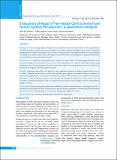Please use this identifier to cite or link to this item:
https://hdl.handle.net/20.500.14356/1463Full metadata record
| DC Field | Value | Language |
|---|---|---|
| dc.contributor.author | Adhikari, Shiva Raj | - |
| dc.contributor.author | Sapkota, Diksha | - |
| dc.contributor.author | Thapa, Arjun | - |
| dc.contributor.author | Pandey, Achyut Raj | - |
| dc.date.accessioned | 2023-05-14T06:38:09Z | - |
| dc.date.available | 2023-05-14T06:38:09Z | - |
| dc.date.issued | 2018 | - |
| dc.identifier.citation | AdhikariS. R., SapkotaD., ThapaA., & PandeyA. R. (2019). Evaluation of Nepal’s Free Health Care Scheme from Health System Perspective: A Qualitative Analysis. Journal of Nepal Health Research Council, 16(41), 372-377. https://doi.org/10.33314/jnhrc.v16i41.1584 | en_US |
| dc.identifier.issn | Print ISSN: 1727-5482; Online ISSN: 1999-6217 | - |
| dc.identifier.uri | http://103.69.126.140:8080/handle/20.500.14356/1463 | - |
| dc.description | Original Article | en_US |
| dc.description.abstract | Abstract Background: Access to high quality medicines is often considered as one of the main obstacle in achieving health for all. With the objective of increasing access to health services of poor segment of population, government of Nepal has implemented free health care program. However, there is strong need for evaluating the performance and coverage of free health Care scheme. In this context, this study aims to provide better understanding on the implementation status of free health care scheme in context of Nepal. Methods: It is a qualitative study conducted in 7 districts of Nepal. Total of 14 focused group discussion were conducted among service providers and service users. All the discussions were carried in neutral and natural setting making sure that each of participants feels free to express their opinion. Focused group discussions were transcribed, translated into English, coded and analyzed manually. Results: Participants shared that free health care has contributed positively in making essential health services reachable, affordable and accessible to all specially benefiting poor segment of population. However, multitude of factors like geographical access, perception of community people towards health services, availability of medicines, laboratory services and human resources come into play determining the utilization of health services. Service providers recommended that there need to be improvements in procurement and supply system for uninterrupted supply of services. Conclusions: Despite having some problems in availability of medicines, human resource and diagnostic services, free health care has improved access to health services specially for poor population. Decentralizing the procurement process can be one promising option to overcome the inappropriate supply of medicines. Keywords: Access to medicine; financial risk; free health care; Nepal; poor. | en_US |
| dc.language.iso | en | en_US |
| dc.publisher | Nepal Health Research Council | en_US |
| dc.relation.ispartofseries | Oct-Dec 2018; | - |
| dc.subject | Access to medicine | en_US |
| dc.subject | Financial risk | en_US |
| dc.subject | Free health care | en_US |
| dc.subject | Nepal | en_US |
| dc.subject | Poor | en_US |
| dc.title | Evaluation of Nepal’s Free Health Care Scheme from Health System Perspective: A Qualitative Analysis | en_US |
| dc.type | Journal Article | en_US |
| local.journal.category | Original Article | - |
| Appears in Collections: | Vol. 16 No. 4 Issue 41 Oct - Dec 2018 | |
Files in This Item:
| File | Description | Size | Format | |
|---|---|---|---|---|
| 1584-Manuscript-7802-3-10-20190221.pdf | Fulltext Article. | 230.11 kB | Adobe PDF |  View/Open |
Items in DSpace are protected by copyright, with all rights reserved, unless otherwise indicated.
